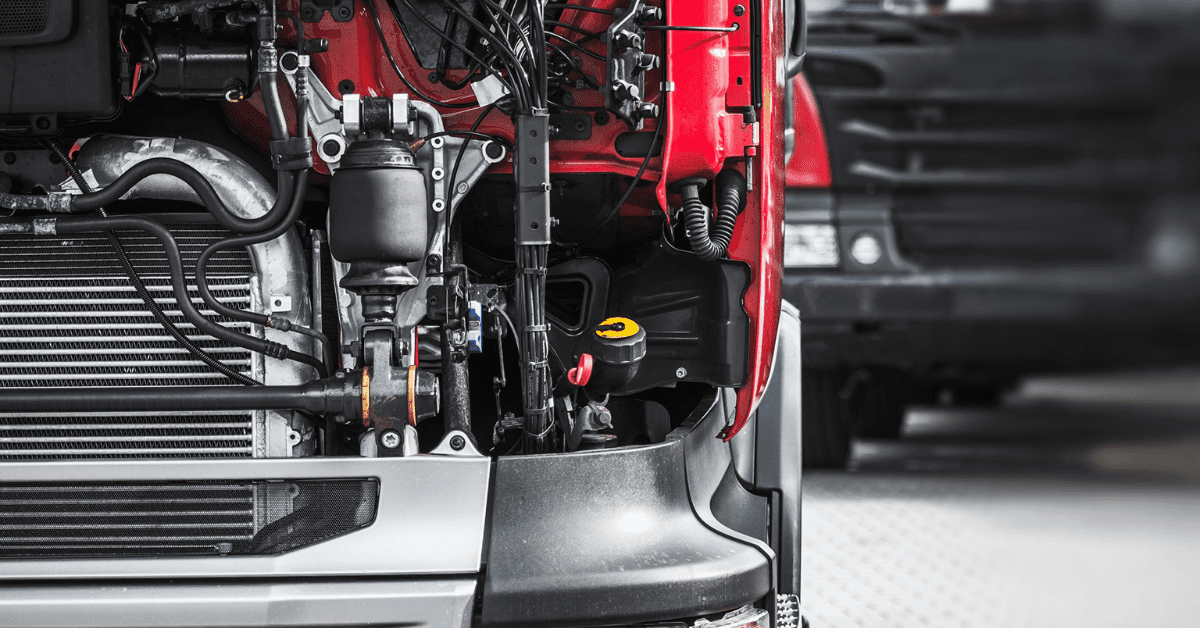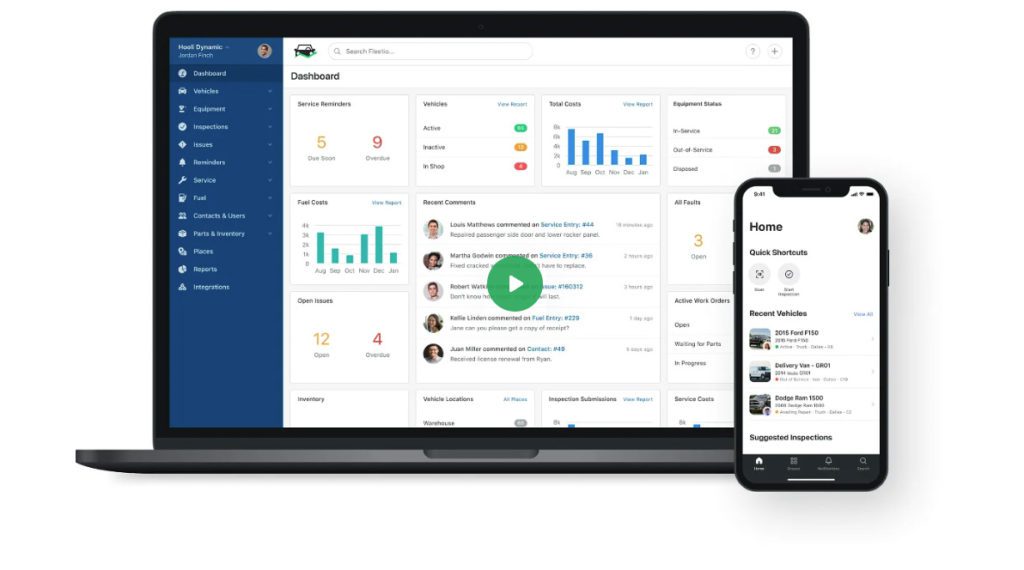Comprehensive Guide to Oil Changes for Fleets
Maintaining fleet vehicles is no small feat. Whether you’re running a delivery service, managing corporate transportation, or operating a logistics company, ensuring your fleet’s smooth operation is essential for your business’s success.
Amidst the bustle of managing day-to-day operations, it’s easy to overlook the importance of regular oil changes.
In this blog, we dive into the nitty gritty of why oil changes are an important part of maintaining your fleet. Changing oil regularly is more than just swapping out a few quarts of oil and installing a fresh filter. Oil changes are a pivotal part of extending the life of your fleet.
In this comprehensive guide, we answer the following common questions about oil changes for fleets:
- Why are oil changes crucial for fleet vehicles?
- How often should fleet vehicles get oil changes?
- How do you select the right oil for your fleet vehicles?
- What are signs that fleet vehicles need an oil change?
- Can you change the oil yourself in fleet vehicles?
- Can you use software to track fleet vehicle oil changes?
- What are some common oil change challenges in fleet management?
Why are oil changes crucial for fleet vehicles?
Regular oil changes are important for all types of vehicles. However, they are especially important for fleet vehicles that get a lot of daily wear and tear. Fleets typically are driven more often and for longer distances than most personal vehicles.
They’re more likely to need regular inspections and maintenance that includes oil and filter changes.
Extending the life of your fleet vehicles’ engines is just one reason to commit to regular oil changes. However, there are other reasons why you should make oil changes as a part of their routine maintenance.
- To protect the engine. Engine oil lubricates the engine’s moving parts, which helps prevent wear and tear. Over time, oil breaks down and becomes contaminated, reducing its effectiveness. Regular oil changes ensure the engine has fresh, clean oil that can protect it from damage.
- To improve fuel economy. Fresh oil helps the engine run more efficiently. When your fleets’ engines are humming along at peak performance, they’ll get better gas mileage. That can save you a bundle at the pump.
- To prevent breakdowns. Dirty or contaminated oil can cause the engine to overheat or fail in a fleet vehicle. Regular oil changes prevent these problems, saving you time and money.
- To boost power and torque. When a fleet vehicle’s engine is maintained properly, it can deliver more power and torque, which in turn improves acceleration and towing capacity.

How often should fleet vehicles get oil changes?
How often fleet vehicles should get oil changes depends on several factors, including how often and how far they’re driven, and the type of oil used in them.
Like personal automobiles, fleet vehicles come with owner’s manuals from the vehicle manufacturer. These manuals provide a recommended maintenance schedule. How often to get an oil change is part of the recommendations.
However, these are just standard suggestions based on ideal conditions. You’ll want to check with your trusted fleet mechanic on how frequently they think your fleet needs fresh oil and filters.
Some of the factors your mechanic might consider when deciding include:
- The type of fleet vehicle. Light-duty vehicles typically need oil changes more often than heavy-duty vehicles.
- The driving conditions. Vehicles driven in harsh conditions, such as extreme heat or cold, may need more frequent oil changes.
- The type of oil used. Synthetic oil lasts longer than conventional oil before breaking down, so using it means a longer time between oil changes.
- The vehicle’s maintenance history. Well-maintained vehicles may not need oil changes as often as a vehicle that previously was not taken care of properly. This is especially true for used fleet vehicles.
How do you select the right oil for your fleet vehicles?
You should always defer to the manufacturer’s recommendations when deciding which oil is right for your fleet vehicles. That information is included in the owner’s manual.
Another consideration is the type of fuel used. Fleet vehicles that use diesel fuel may need a different type of engine oil than vehicles that use gasoline.
There are two main types of oil you can use in your fleet: conventional and synthetic.
Conventional oil is the most common. It’s made from petroleum and contains additives that help to protect the engine.
Synthetic oil is made from artificial ingredients and doesn’t contain as many additives as conventional oil. It’s more stable and can last longer than conventional oil, making it a popular choice among fleet vehicle owners.
You also have the option of:
- Heavy-duty oil is designed for fleet vehicles used for heavy-duty applications. It’s thicker than conventional oil and can withstand heavier wear and tear.
- High-mileage oil is designed for fleet vehicles that travel longer distances more frequently. It contains additives that help to protect the engine.

What are signs that fleet vehicles need an oil change?
Ideally, if you follow the maintenance schedule recommended for your fleet vehicles, you shouldn’t need to worry about monitoring signs that it’s time for an oil change. However, even when you take proper care of your fleet, engine problems can still happen.
Here are some of the most common signs it’s time to visit your trusted fleet mechanic for an oil checkup and change:
- The oil light on your dashboard is on. It’s the most obvious sign that your vehicle needs an oil change. However, it’s usually the last sign your fleet’s engine sends before experiencing major issues.
- The oil level is low. Between oil changes, you should monitor the oil level using the vehicle’s dipstick. If the level is low, add some oil, and check it again the next day. If the oil is low again, it could signal a leak or other serious issues.
- The oil is dirty or dark. When you check your oil, if it appears dirty or darker than usual, it might be breaking down and need changing.
- The engine is making strange noises. When oil breaks down, it loses its lubricating properties. This can cause your fleet vehicle’s engine to make unusual noises like clicking or grinding.
- The engine is overheating. If your fleet vehicle keeps running hot, that’s a tell-tale sign the oil isn’t doing its job of keeping the engine cool.
If you notice any of these signs, give your mechanic a heads up and get your fleet vehicle in for an inspection and troubleshooting.
Can you change the oil yourself in fleet vehicles?
Can you change the oil in your fleet vehicles yourself? Technically, yes. But just because you can doesn’t mean you should. Here’s why.
For starters, it’s not the best use of your time. Changing the oil in each one of your fleet vehicles yourself can be a time-consuming and labor-intensive process. It’s often more efficient to have a professional mechanic do it for you.
There’s also the possibility you could make a mistake that could damage the engine. Forgetting to change the filter or using the wrong type of oil can lead to costly repairs.
Lastly, it’s possible you could void the manufacturer’s warranty. Some warranties require you to have your fleet vehicles’ oil changed by a qualified mechanic. Check the terms and conditions before you even think about trying an oil change yourself.

Can you use software to track fleet vehicle oil changes?
Software exists to help fleet vehicle owners keep track of oil changes. Managing day-to-day business operations can get hectic. It’s easy to overlook when it’s time to change the oil in your company’s vehicles.
Using software designed for this purpose can help you keep on top of oil changes and other scheduled maintenance.
Some of the most popular options include:
- Fleetio is a fleet management software that helps businesses track their vehicles, including oil changes. You can create custom oil change schedules based on the manufacturer’s recommendations, driving conditions, and other factors. The software sends notifications when it’s time for an oil change.
- Force™ by Mojio is another fleet management software that uses telematics to track vehicle data, including oil changes. It automatically generates oil change reminders based on a vehicle’s mileage and driving conditions. You can track and generate reports on oil change costs and compliance for your records.
When deciding which software solution to use, consider the features offered, how easy it is to use, the cost, and the level of customer support.
What are some common oil change challenges in fleet management?
Oil changes are a necessary part of fleet maintenance. However, they can be challenging to manage. Some of the most common obstacles business owners encounter when trying to manage the health of the fleet include:
- Scheduling oil changes
- Tracking oil change history
- Managing oil change costs
- Ensuring compliance with government regulations (when applicable)
Using fleet-management software is one way to effectively get a handle on all these issues. There are several options from which to choose, so pick one that meets your needs and your budget.
You also can opt to work with a qualified provider that specializes in oil changes for fleet vehicles. Rio Grande Automotive has skilled fleet mechanics who can handle all your maintenance needs, including routine oil changes.
Give us a call to schedule your next oil change or to discuss setting up a maintenance schedule for your fleet.